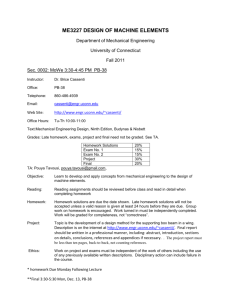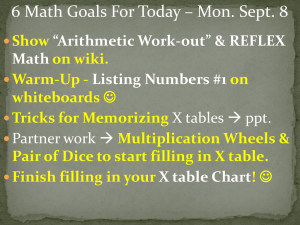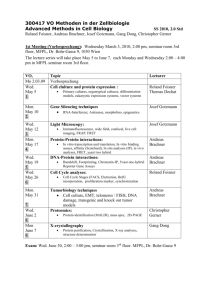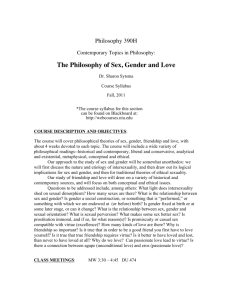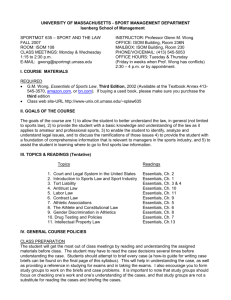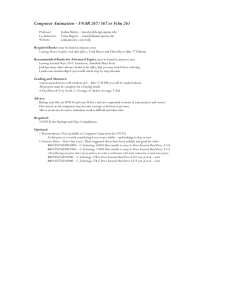Art 110 - Westminster College
advertisement
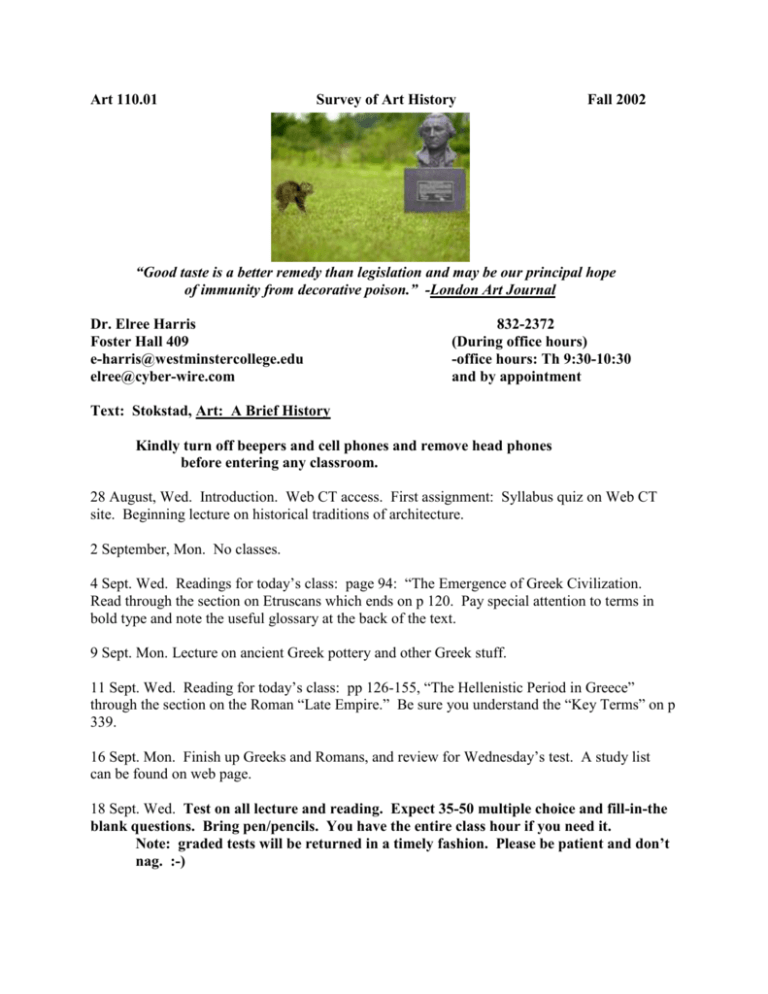
Art 110.01 Survey of Art History Fall 2002 “Good taste is a better remedy than legislation and may be our principal hope of immunity from decorative poison.” -London Art Journal Dr. Elree Harris Foster Hall 409 e-harris@westminstercollege.edu elree@cyber-wire.com 832-2372 (During office hours) -office hours: Th 9:30-10:30 and by appointment Text: Stokstad, Art: A Brief History Kindly turn off beepers and cell phones and remove head phones before entering any classroom. 28 August, Wed. Introduction. Web CT access. First assignment: Syllabus quiz on Web CT site. Beginning lecture on historical traditions of architecture. 2 September, Mon. No classes. 4 Sept. Wed. Readings for today’s class: page 94: “The Emergence of Greek Civilization. Read through the section on Etruscans which ends on p 120. Pay special attention to terms in bold type and note the useful glossary at the back of the text. 9 Sept. Mon. Lecture on ancient Greek pottery and other Greek stuff. 11 Sept. Wed. Reading for today’s class: pp 126-155, “The Hellenistic Period in Greece” through the section on the Roman “Late Empire.” Be sure you understand the “Key Terms” on p 339. 16 Sept. Mon. Finish up Greeks and Romans, and review for Wednesday’s test. A study list can be found on web page. 18 Sept. Wed. Test on all lecture and reading. Expect 35-50 multiple choice and fill-in-the blank questions. Bring pen/pencils. You have the entire class hour if you need it. Note: graded tests will be returned in a timely fashion. Please be patient and don’t nag. :-) 23 Sept. Mon. Begin the unit on early Christian and Byzantine eras, which begins on p 156 in your text (Chapter 7). Also read Chapter 8, pp 182-191. We won’t have time to spend on Islamic art, but it’s important, so take the time to at least look at it. 25 Sept. Wed. More early Christians and Byzantines. 30 Sept. Mon. Begin unit on Medieval period, art, architecture and culture. Reading for today’s class: Chapter 10, “Romanesque and Gothic Art.” 2 Oct. Wed. More Medievalism. Read Chapter 10 again. 7 Oct. Mon. More Medievalism. 9 Oct. Wed. Finish Up unit on Medievalism. Review for Wednesday’s test. Study list is available on the web page. 14 Oct. Mon. Test on all lecture and reading in Romanesque and Medievalism unit. Expect 25-30 multiple-guess or fill-in-the-blank questions and one 20-point short essay question. Bring pen/pencils. I will supply test and blue book. 16 Oct. Wed. Begin unit on the Renaissance. Reading for next time: Chapter 11: “Early Renaissance Art,” and “Cennini on Panel Painting,” p 247, and about mural painting on p. 133. 21 Oct. Mon. Continue with lecture and reading in Renaissance art and culture. 23 Oct. Wed. Look over Chapter 13, “Baroque and Rococo Art,” focusing on the section on “Baroque Art in Protestant Netherlands.” We’ll focus on Baroque painting and the spirit behind the Baroque, rather than specific architecture and interiors. 28 Oct. Mon. Finish unit on Renaissance and Baroque, and review for Wednesday’s test. A study guide can be found on the web page. 30 Oct. Wed. Test on all lecture and reading in Renaissance and Baroque unit. Expect 2025 short-answer questions and two short essay questions worth 10 points each. N.b.: Friday, 1 November, is the last day to elect the credit/no credit option. 4 November. Mon. Begin unit on modern era. Reading for next time: Chapter 15, “Neoclassicism and Romanticism.” 6 Nov/ Wed. Neoclassicism and romanticism. 11 Nov. Mon. More Neoclassicism and Romanticism. 13 Nov. Wed. Reading for today’s class: Chapter 17, “Realism to Impressionism.” N.b.: today is the last day to withdraw from classes with a WP grade. 18 Nov. Mon. Continue unit on Realism and Impressionism. 20 Nov. Wed. Reading for today: Chapter 18, “Post-Impressionism through Early Modern Art.” 25 Nov. Mon. More on Early Modern Art. 27-30 Nov. Thanksgiving Break. 2 December, Mon. More on Modern Art—additional reading if we get that far. 4 Dec. Wed. Finish the modern art unit. 9 Dec. Mon. Last class day—this will be a review of the last unit and whatever else you need to review for the final. Final Exam. Check the Fall 2002 Class Schedule for time and date. Please note that it is strictly against college policy to make any changes in exam time, or to reschedule final exams to fit individual needs. If you want to leave town early, you’ll have to give up the points for the final. Expect the same format as with previous exams. There will be 40 objective questions: the questions on the last unit will be new; all the other questions will be taken from earlier tests, so you can use your old study sheets. A supplemental study sheet will be available for this last unit. In addition, there will be four short-answer essay questions, each worth a possible 15 points. Total possible points for the comprehensive final: 100. Grading: Grades are calculated on a percentage basis of the total points possible in all the tests. I grade on a curve, but since several people always manage perfect scores, count on 90-100% of the total possible points being an “A,” and so forth. You are responsible for all lecture material, and for all assigned reading, whether it is discussed in class or not. All written work must be at college-level competency—we won’t have time for composition lessons, so if you aren’t sure how to write an essay question, please go to the Start Center and request a tutor. You will be expected to read, listen, and think. If you have to miss a lecture, kindly get notes from at least two people in the class and set up an appointment with me to ask specific questions. I’m happy to spend the extra time for one-on-one help, but you have to ask. Attendance: Since at least half of every test is from material not covered in the text, attendance is crucial. If you miss more than three classes in a row without contacting me, I will drop you from the grade rolls. Contacting me: Please phone during office hours, or use either of my e-mail addresses. My voice mail has been full for about three years and I never remember to check it anyway, so let’s just pretend I don’t have it. Studying: Probably the best way to do well in this course (besides coming to class and staying awake and asking questions about anything you don’t understand) is to outline each assigned chapter and be sure you know the terms set in bold-face type in each assigned reading section. In addition, it’s a good idea to organize and outline your class notes as soon as possible after every class while the material is still fresh in your mind. This is particularly important since much that is covered in class is not in your text. Staying Awake: When the lights go down and the projector hums, it’s easy to nod off, even when the subject is fascinating and the professor dynamic. The best remedy is to ask a question. Coming up with something intelligent to ask, and then speaking in a group will get the adrenalin going. If you can’t do that, please leave the room long enough to walk around, get a drink of water, or do jumping jacks in the hallway. If you are persistently and obviously asleep, you will be asked to leave long enough to wake up. Disabilities: If you need academic accommodations because of a disability, please inform me immediately. To request academic accommodations, you must also register with the Services to Students with Disabilities Office in the START Center at 832-2280. Extra Credit: Don’t even ask. There are no provisions for extra credit—just lots of credit for good work produced consistently throughout the semester. In other words, do your best and don’t ask for special dispensation. Mistakes have been purposey made in this syllabus to let out evil spirits.





